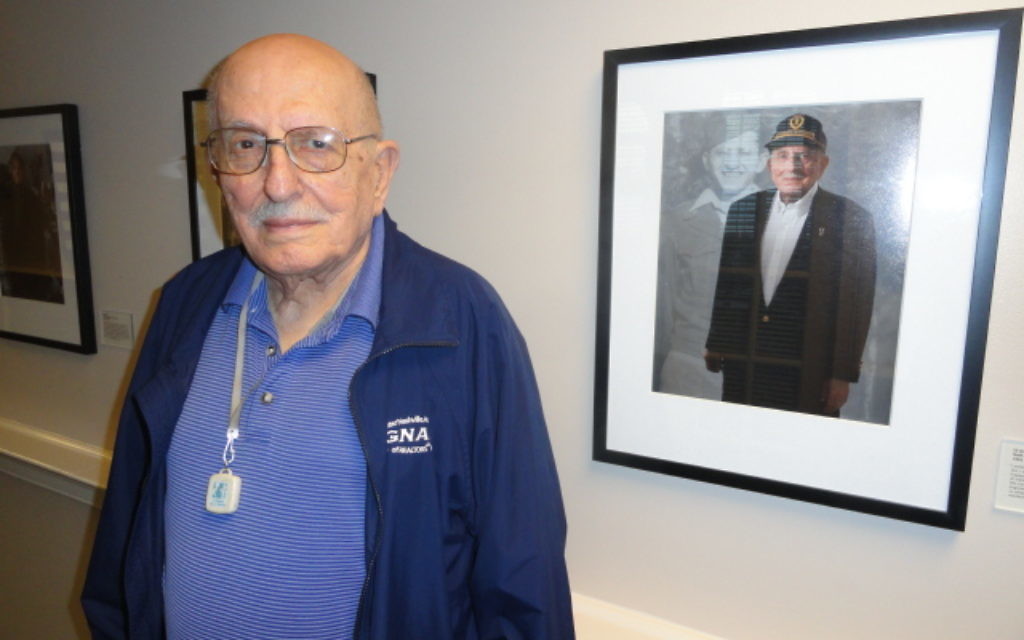WWII Vet Reflects on Life From Bulge to Belmont
“If I’d known I was going to live this long, I would have taken better care of myself,” joked 90-year-old Eli West Jacobs, a decorated veteran of World War II who lives in the Belmont Village at Buckhead retirement home in Sandy Springs.

With Veterans Day coming Wednesday, Nov. 11, Jacobs and six other war veterans who live at Belmont are being honored with an exhibition there called “American Heroes: Portraits of Service.” Also recognized is Vera Barton, a Holocaust survivor who was liberated from Auschwitz in 1945.
The portraits were taken by photographer Tom Sanders, whose book “The Last Good War: The Faces and Voices of WWII” includes residents of Belmont locations around the country.
Get The AJT Newsletter by email and never miss our top stories Free Sign Up
Nashville-born Jacobs, who was awarded two Purple Hearts, sat in a private room at the center to talk about his life. Also present was his daughter Shelley Jacobs Antin, who visits him three times a week and is one of four children. Jacobs moved into Belmont five years ago with his wife, Estelle, who died in 2013.
“We lived with Shelley and (her husband) Bob for about four months until they threw us out,” Jacobs said with a laugh.
Rising to the rank of staff sergeant, Jacobs served in the U.S. Army from 1943 until 1946. When he enlisted, he asked to join the Air Corps, but he was sent to Fort Benning as an infantryman instead. “I didn’t want that, but there was nothing I could do,” he said. “So I had 13 weeks in training, and in the last week I got sick. They sent me to a hospital for three days, and when I got out, my shipment had left without me.”
Jacobs ended up completing several training cycles at Fort Benning and in Pennsylvania before shipping overseas.
“I did training in England for two months for combat engineering, and then two days after D-Day we went into Normandy. Those weren’t good days. In my company we had trucks. We had bulldozers. We had to clear the road of mines. These were anti-personnel mines. About three weeks later they sent us (farther south), and I was wounded there,” he said. “We were guarding something. I don’t know what it was, but there were snipers.”
Jacobs’ second, more serious wound happened during the Battle of the Bulge. “The first sergeant came in and said, ‘Saddle up, you’re going to Belgium. We’ve got trouble up there.’ So we got on the truck. It was the worst cold winter, and that’s when I got wounded in my face and my leg.” Jacobs recalls his captain, for whom he was driving, as being something of a “nut” who always wanted to be at the front of the pack.
“I was in hospital for four or five weeks in Nances,” France, he said.
He finally got to join the Air Corps and finished his service in Germany in 1946. Jacobs enrolled at Western Kentucky University on the G.I. Bill “because they had a real good accounting department, and that’s what I wanted to take. I got out, got a job with a CPA firm, but that got old, so I quit and got my real estate license. At that time, the ’70s, real estate was really good and stayed that way until I retired in 2002. Then it went bad.”
Jacobs and his wife also ran Zager’s Fine Foods in Nashville for almost a decade. The deli and catering business became a well-known fixture on Music Row and operated three other locations as well, attracting a string of celebrity customers.
The couple left Nashville for good after a flood destroyed their home, and they moved to Atlanta in 2010 to be closer to all their offspring, including eight grandchildren and two great-grandchildren.
Asked how he likes living in an upscale retirement home, Jacobs said: “This place is great. It’s the Waldorf-Astoria. I can afford to live here for the rest of my life — if I die next Tuesday.”






comments